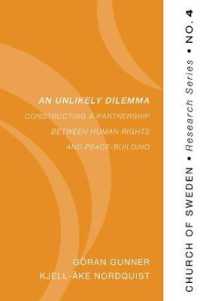- ホーム
- > 洋書
- > 英文書
- > Business / Economics
Full Description
This is an innovative analysis of the agrarian world and growth of government in early modern Germany through the medium of pre-industrial society's most basic material resource, wood. Paul Warde offers a regional study of south-west Germany from the late fifteenth to the early eighteenth century, demonstrating the stability of the economy and social structure through periods of demographic pressure, warfare and epidemic. He casts light on the nature of 'wood shortages' and societal response to environmental challenge, and shows how institutional responses largely based on preventing local conflict were poor at adapting to optimise the management of resources. Warde further argues for the inadequacy of models that oppose the 'market' to a 'natural economy' in understanding economic behaviour. This is a major contribution to debates about the sustainability of peasant society in early modern Europe, and to the growth of ecological approaches to history and historical geography.
Contents
List of figures; List of maps; List of tables; Acknowledgements; Glossary; List of abbreviations; Introduction; 1. The peasant dynamic; 2. Power and property; 3. The regulative drive; 4. From clearance to crisis?; 5. The two ecologies; Conclusion; Bibliography; Index.




![アーノンクール(ニコラウス)/ヘンデル~モーツァルト/モーゼル編:「アレクザンダーの饗宴」[「ティモテウス、または音楽の力」K.591]](../images/goods/ar/web/vimgdata/4547366/4547366196344.jpg)



